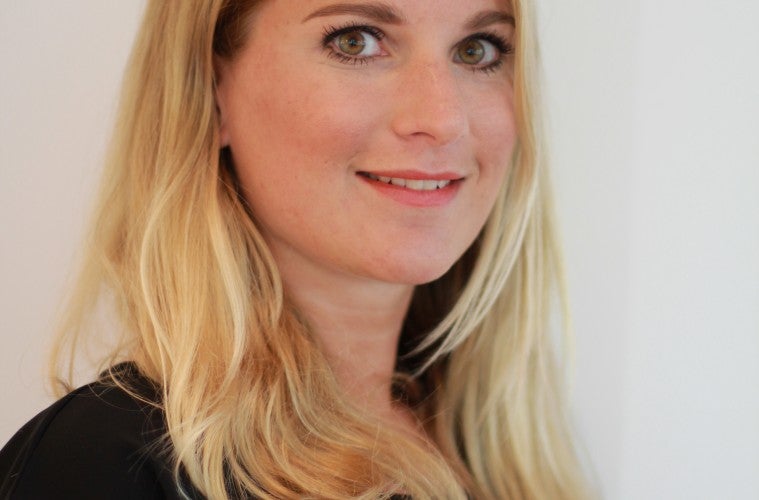Even before she studied Criminology, Ireen Lammerts wanted to join the police. After graduation, she applied for the Criminal Investigation Master, but she ended up working for the Royal Bank of Scotland. ‘It turned out to be the right decision.’ Now she fights fraud at SNS Retail Bank.
Did you find your ideal job straight out of university? “No, first I spent a year working in a student cafe. I was focused too much on working for the police. After I graduated, I immediately applied for the Criminal Investigation Master’s programme, and once I had completed the procedure I sent my CV to the Amsterdam-Amstelland police corps. But due to the flood of criminology CVs, the corps chose someone else. I had wasted nine months for nothing, and I was extremely disappointed. The other police corps in the country had all stopped hiring, so to pay the bills I got a job in a cafe.”
How did you end up in the banking world? “When one of my friends saw an opening at the Royal Bank of Scotland, I was immediately excited, and my bar experience helped me get a job as a Business Management Analyst at the Corporate Security Services department. They asked me how I would react in certain situations, and with my bar experience it was easy, because I had had to deal with difficult people and conflicts – things you don’t learn from a textbook. Three years later, I applied for the position of Security Affairs Consultant at what is now SNS Retail Bank.”
‘Actually, I adjust my work day around the frauds’
What is your average work day like? “Every day is different! I work on payment transaction fraud – cybercrimes like phishing and malware. I’m also in a work group that studies new payment methods, such as prepaid cards and virtual currency. There, I study what factors contribute to crime, how they develop and how we can ensure that criminals cannot use them to do things like launder money. Actually, I adjust my work day around the frauds, but of course I always try to stay one step ahead of them. Around once per week I have meetings away from the office.”
What do you enjoy about your work? “As a Security Affairs Consultant, I make quick connections, see trends and react to incidents. Fraudulent money is often moved around quickly, so I have to act fast to limit the damage. I really like the diversity of my work. In order to combat fraud, I work together with a number of parties in the Netherlands and abroad.”
And what do you like least? “That it sometimes takes so long before the police to pick up the case, so the criminals are brought to trial too late.”
What tips do you have for Criminology students? “Don’t focus on just one thing when you’re about to graduate. Diversify your options. After my studies, I really wanted to join the police, so I couldn’t find a job. But with Criminology, you can also work at the Security Affairs department at a bank, Shell or Philips.
Oh yeah, promote yourself. If a criminologist is speaking at the university, go up and introduce yourself. Or if you’re not assertive enough, do it via LinkedIn. When I had to give a presentation for Criminology students, two students came to talk to me afterwards. That was smart of them, because one now has a job at SNS Retail Bank and the other one is doing an internship.”
‘I learned quite a bit about the person behind the criminal’
Why did you choose the Master in Social Organisations and Criminality? “I am really interested in the origin, investigation and prevention of organised and international crime. I also took several courses for the Master in International Crimes and Criminology, and I really enjoyed the course ‘International Criminal Courts and Tribunals’. I learned quite a bit about the person behind the criminal, but also about the people who witness a crime but don’t intervene.”
How did you like the Master? “It was great! I had plenty of freedom. There were a few compulsory courses, but otherwise I was able to take whatever courses I wanted. I mainly used that freedom to do part of my Master in Cape Town, which is a fantastic city. When I look back, it’s strange that we didn’t have any courses on cybercrime, which is the hot topic today.”
What did you do in Cape Town that was so fantastic? “For my Master’s thesis, I studied the relative deprivation in the period immediately after Apartheid in Cape Town, South Africa. That is the subjective dissatisfaction due to the relative position compared to that of others, which can be a stimulus for crime. I lived in Cape Town for three months and studied the differences between ‘blacks’, ‘coloureds’ and ‘whites’ in 2008. I spoke to people in retirement homes, on the street, in schools and in the townships. I even spoke to a man who had spent a few years in prison with Nelson Mandela. But I also talked to whites who were nostalgic about Apartheid. That was occasionally frustrating and disturbing, because it made the inequality painfully obvious.”
Where do you see yourself in 10 years? “No idea. I never look that far ahead. If I don’t enjoy my work by that time, then I’ll look elsewhere. Maybe in 10 years I’ll end up working with the police.”
CV BLOK






